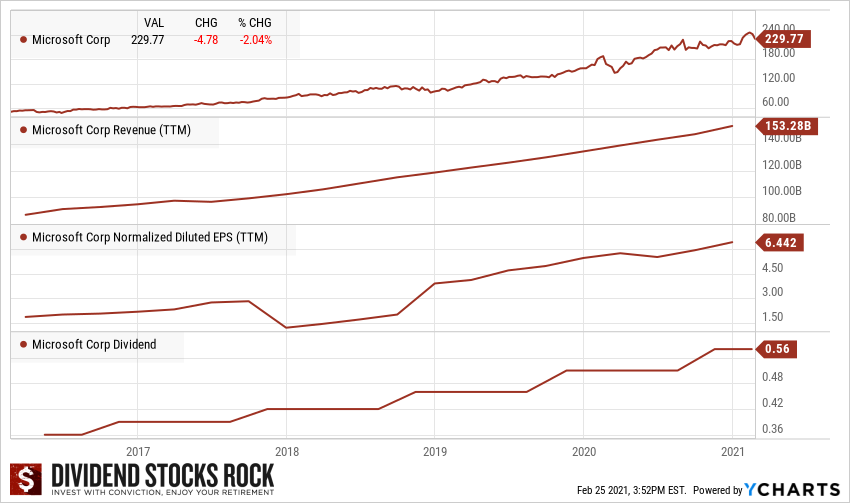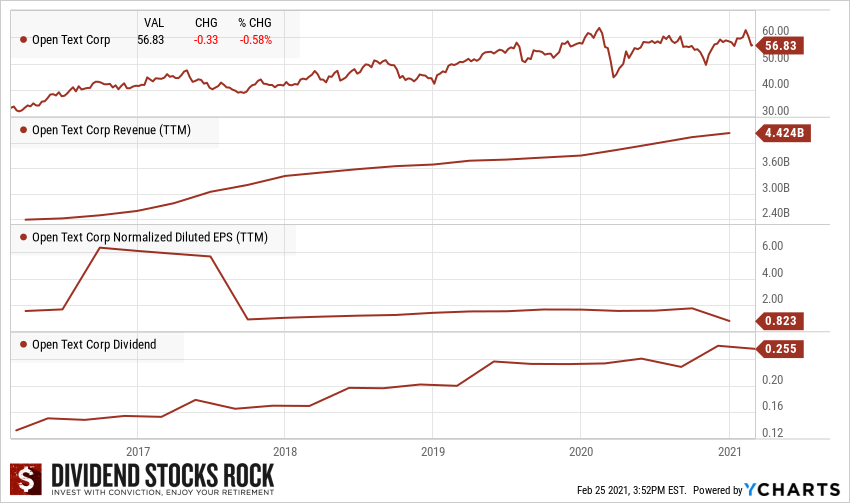We would separate tech stocks into two different categories:
#1 Companies with disruptive technology entering various fields such as retail (Amazon), Television (Netflix), Financials (Robinhood) or accommodation (Airbnb). Those companies are fighting for market share and they are rapidly growing. They are not interested in paying dividends.
#2 Companies that were once growing rapidly through technology breakthroughs but have now grown-up. These are “adult” tech stocks that are well established in their respective markets. Since it’s in their DNA to develop new technology, they are still manifesting several growth vectors.

At Dividend Stocks Rock, we are interested in the latter. Older tech stocks have developed new markets that are relatively mature now. We can think of Microsoft and Intel that were at the very beginning of the PC era. Now that consumers are shifting toward smartphones and tablets, PC sales are slowing down. However, both companies still enjoy strong cash flow generation from their PC related activities. At the same time, they have also developed other technology (cloud, big data, data center, etc.) that enables them to post high-single digit to double-digit revenue growth.
Sub-Sectors (Industries)

Greatest Strengths
If you want to find dividend payers among tech stocks, your best bet is in the semiconductor industry. This is where you will find companies like Broadcom (AVGO), Intel (INTC), Texas Instruments (TXN), Qualcomm (QCOM), Analog Device (ADI) and Taiwan Semiconductor (TSM). They are all “old” techs that have gone through several technology cycles and found ways to get bigger and stronger. Today, they are all showing great perspectives. Their expertise, size and reputation are their best assets.
Another industry that is on the rise in Canada is software or often called SaaS (software as a service). SaaS businesses are built around my favorite concept: recurring revenues. You will find companies like Sylogist (SYZ.V), Absolute Software (ABST.TO), Open Text (OTEX.TO), Enghouse (ENGH) and Tecsys (TCS.TO). Those companies will usually use their exceptional cash flow generation capabilities to acquire smaller firms to increase their market share. Their yield is minimal (besides Sylogist), but their dividend growth and capital growth are phenomenal.
I’ve discussed my Top 3 Canadian SaaS Tech Stocks in this video below:
Greatest Weaknesses
It is usually rare to find tech stocks with a high dividend yield. If you are looking for tech stock with a 6% yield, you will not find them on our list. We use this sector to boost our portfolio value appreciation while supporting a minimum level of income.
The risk with tech stocks is to fall for the proverbial “false hope”. “Hope” that a new technology breakthrough will happen and save the business. “Hope” that the stock price will skyrocket during the next quarter. “Hope” that you will find the next Microsoft or Apple (AAPL). You are better off keeping the ones who have proven themselves instead of looking for the next homerun. If you keep-up with your “hope strategy”, you will create your own tech bubble and no doubt get burnt.
The second risk with tech stocks is obviously the speed at which technology evolves over time. You never know if you are holding the next BlackBerry (BB) or the next Apple in your portfolio. Therefore, it is important to select companies that have a well-established growing business model, and they multiply that growth through other avenues at the same time.
How to Get the Best of It
It seems counter-intuitive to use dividend metrics to select companies that are anything but high yielders. However, if you use the dividend triangle to determine which tech stock to buy, you are likely to acquire a company thriving in its environment that feels confident enough to reward shareholders at the same time. Dividend growth is rare in this sector and this is how you can identify a company that will not bust in your face.
The dividend triangle will prevent you from buying Facebook, Netflix, Tesla, and the likes. However, it will also prevent you from buying BlackBerry, Nortel, and Yahoo! at their peak price.
The technology sector is best for growth investors but could also offer a safe haven for income investors.
Favorite Picks
Microsoft (MSFT)
- Market cap: 1,765B
- Yield: 0.95%

Business Model
Microsoft develops and licenses consumer and enterprise software. It is known for its Windows operating systems and Office productivity suite. The company is organized into three overarching segments: productivity and business processes (legacy Microsoft Office, cloud-based Office 365, Exchange, SharePoint, Skype, LinkedIn, Dynamics), intelligence cloud (infrastructure- and platform-as-a-service offerings Azure, Windows Server OS, SQL Server), and more personal computing (Windows Client, Xbox, Bing search, display advertising, and Surface laptops, tablets, and desktops). Through acquisitions, Microsoft owns Xamarin, LinkedIn, and GitHub. It reports revenue in product and service and other revenue on its income statement.

Investment Thesis
Microsoft is one of the oldest and newest tech companies at the same time. While it benefits from a strong core business model generating cash flow through a subscription-based model, management has proven its ability to develop other growth vectors. Its most recent success is called Azure, which is No. 2 in public cloud services. Azure is on a path for strong growth over the upcoming years. Cloud services will also be part of the future of any serious business. Speaking of which, its strong relationship with corporate America opens the door for additional cross-selling opportunities as the cloud business expands.
Open Text (OTEX.TO) (OTEX)
- Market cap: 16B
- Yield: 1.80%

Business Model
Imagine a big business that employs 100 people and keeps growing. Each day, tons of information is collected about products, sales, employees, expenses, contracts, etc. This information is piling up in mountains of unreadable reports. It needs a solution to receive, integrate and digest this data. This is called an Enterprise Information Management (EIM) system. EIM helps managers make better decisions by organizing the information to access it rapidly, understand it and trust it. OTEX is a leader in the industry and Canada’s largest EIM provider. It helps over 100,000 customers share, store, retrieve and analyze their company’s information.

Investment Thesis
Big data, cloud, and security are three keywords you are not done hearing about. As we evolve through an era of consolidation, businesses grow larger every second. Managing growth is one thing but dealing with the enormous amount of data this growth is bringing inside each company is part of Herculean labors. Enterprise Information Management (EIM) systems have been developed to manage this issue, and OpenText happens to be one of the leaders in this emerging business. OTEX has developed a strong expertise in growth by acquisition. Each time it adds a new business, it increases its cross-selling opportunities.
The post Technology Sector: Expertise, Size and Reputation are Its Best Assets! appeared first on The Dividend Guy Blog.
